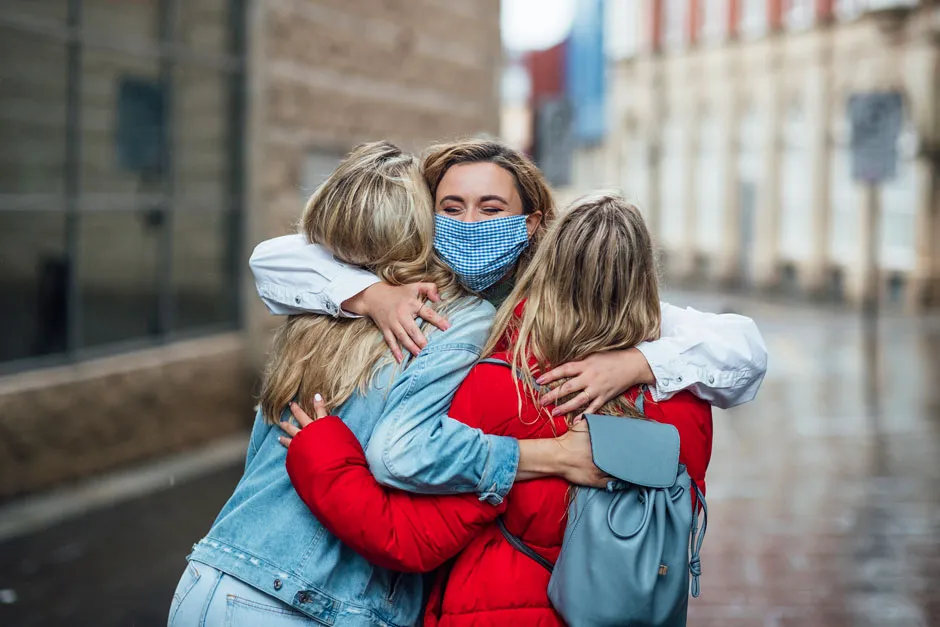Over 400 days since the UK was first put into a state of lockdown due to the COVID-19 pandemic, select major social distancing guidelines are finally set to be dropped. The biggest of which: the 'ban' on hugging.
As part of further easing of lockdown restrictions in England, from Monday 17 May friends and family will finally soon be able to cuddle with people they don’t live with. People in Wales have been permitted to hug since 3 May.
'Following the announcement of the relaxed social distancing measures, Prime Minister Boris Johnson himself has said he would be hugging “with caution and restraint” and hoped that people would use their “basic common sense” when it came to physical contact.
It's at this point you may be asking one big question: how do you hug somebody with caution?
Should you have your hands hovering awkwardly a few centimetres from their back? Don a full hazmat suit? Or just pretend like you're hugging that bad-breathed uncle you have who claims he's allergic to toothpaste?
Below – with the help of virologist Dr Grace Roberts from the Wellcome-Wolfson Institute for Experimental Medicine at Queen's University Belfast – we unpack the (lack of) science behind the concept of 'cautious hugging'.
How can I hug somebody cautiously?
Scientifically, there is no definition for a 'cautious hug'. As you may have guessed, there have been no studies examining which hugging style is safest, and experts don’t have the data to quantify how risky a cuddle is.
However, scientists can say with relative certainty that the best way of reducing the risk of spreading coronavirus currently is simply not to hug somebody.
“There is no absolutely safe way to hug somebody – just because you can doesn’t mean you should,” says Roberts.
“Remember, if you do hug somebody you have to accept there is a risk. You’re putting your respiratory system near somebody else’s respiratory system. And if they’re infected (and they may be asymptomatic) then it’s certainly a real risk.”
“If you’re infected, you’re literally breathing out the virus. In fact, we know now that breathing and talking are the main forms of transmission – not touch.”
Read more about coronavirus:
- Twodoses of Pfizer vaccine reduces risk of death by 97 per cent
- Here’s why you can’t directly compare coronavirus vaccines
But, hypothetically, let’s assume you do hug somebody from outside your household in the next few days. Will holding your breath, wearing a mask or turning away from your huggee potentially lower the risk?
“We have no real-life knowledge of whether that would help or not,” says Roberts. “But even if you’re not hugging, you’re still likely to breathe quite close to where somebody else is breathing. And it’s not like you can breathe out and suddenly all the air magically disappears – it can linger."
“We also can’t be sure how much a mask will protect you. And if you’re close to somebody, your masks may be touching, and the masks may be gaps around your cheeks.”
She adds: “Yes, outside is always safer than indoors, but if you’re hugging you’ll still be breathing next to one another – there is still risk there.”
In short, there’s no quick-fix method to reduce your risk of spreading coronavirus while hugging. You can’t hug somebody cautiously.
However, you can take caution when considering two major factors: if you or the person you’re hugging is vaccinated and how many people you’ve recently socialised with.
Is it safe to hug somebody that’s completely vaccinated?
With every hug, there is a risk of spreading the coronavirus, but the risk will be lower if both people hugging have received a vaccine. This is because somebody who has received a vaccine is more protected against the virus, and – according to preliminary research – less likely to transmit the disease.
Indeed, as a (yet to be peer-reviewed) Public Health England study of 365,000 households with a mix of vaccinated and unvaccinated people indicated, you are 40-60 per cent less likely to transmit the virus if immunised with a single dose of either the Pfizer or Oxford/AstraZeneca vaccines.
“As many of the coronavirus vaccines have an efficacy rate of 90 or 95 per cent, you’re highly unlikely to have coronavirus if you’ve been double vaccinated,” says Roberts.
“However, data has suggested the vaccines are slightly less effective in elderly people. If you want to help your elderly relatives who have been double vaccinated, the risk is low. The risk is obviously much higher if you haven’t been double-vaccinated.”
Ultimately, As Roberts points out, if you haven’t been vaccinated and been socialising with others recently, the best way to protect an elderly relative (even if they have been vaccinated) is simply to not hug them.

While vaccination takes a major role in reducing the risk of spreading coronavirus, you can further lower it by limiting social contact with others before hugging somebody else.
“Obviously if you have to go to work, go to work. But if you’re worried, maybe not go to the pub or meet with friends for a week beforehand. That massively reduces the risk,” she says.
“It’s not the gold standard, but if you get a lateral flow test three days beforehand and on the day itself, and both tests are negative, you can be pretty sure you’re going to be OK with an elderly vaccinated relative. But it won’t eliminate all risk.
“The risk is never zero. But you can limit that risk. And testing and vaccinations are the best ways to do it.”
About our expert, Dr Grace Roberts
Dr Grace C Roberts is a research fellow at theSchool of Medicine, Dentistry and Biomedical Sciences at Queen's University Belfast. She studies virology and has examined the Chikungunya virus among other topics.
Read more about COVID-19: